Throughout a person’s lifetime, they will likely change careers at least once. While the Great Recession that spanned 2007 to 2009 sparked the charge for many professionals to seek work outside their field to make ends meet, the workforce itself and the people who populate it have their own reasons for diving into something new. Not satisfied with the status quo, many professionals are personally motivated to find a job that offers them a greater sense of fulfillment, better pay, and more room for growth.
Drexel University recently polled 320 U.S. residents between the ages of 30 and 54+ who recently made a career change. We learned more about their reasons for making the big leap, what steps they took to get there, and how they feel about their decision today.
Participants in this survey spanned the country and shared their insights on what it was like to transition to a new career, the steps they took, and what were some of the hardest and most rewarding parts of their journey.
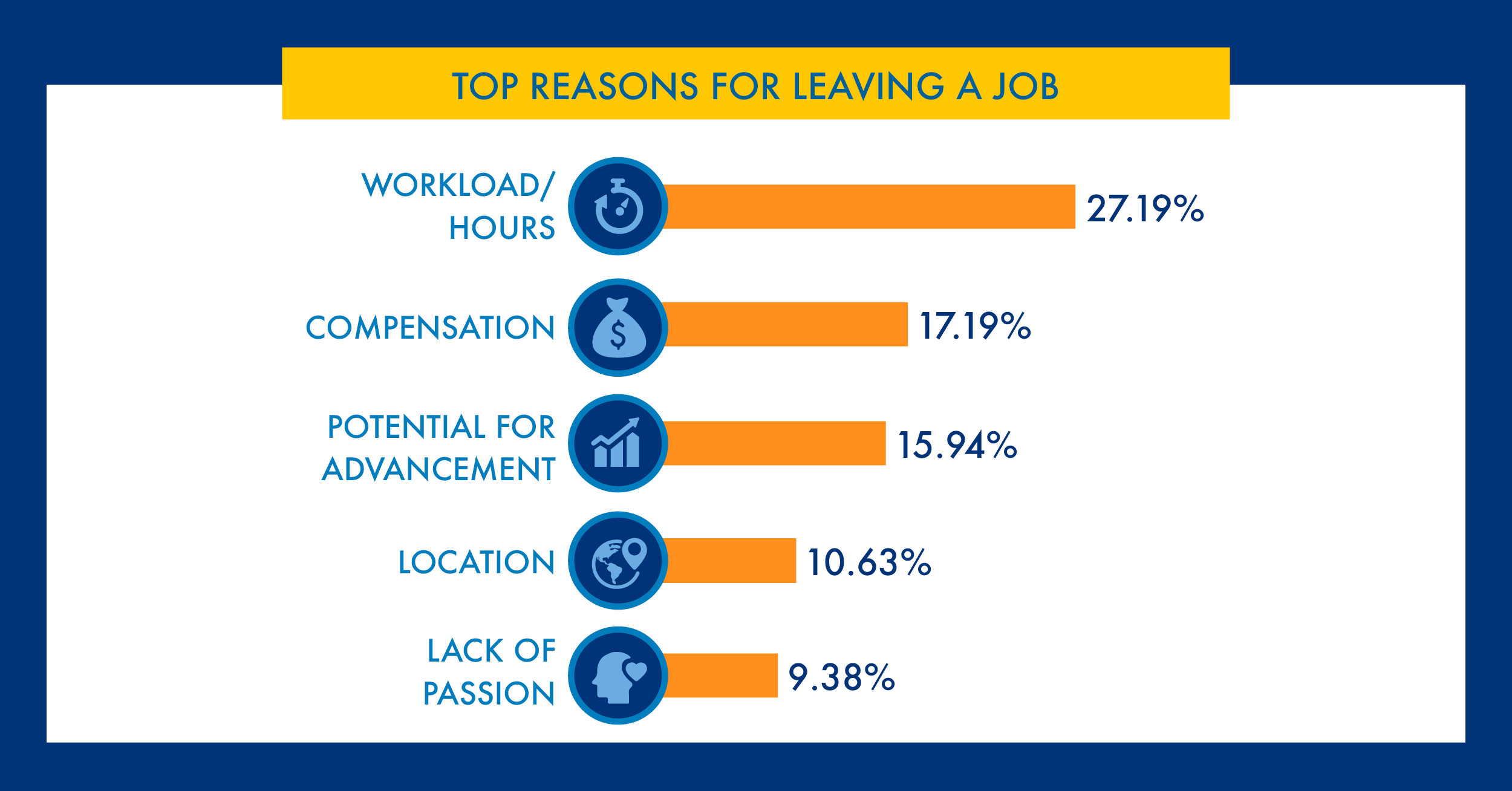
Change of Job, Change of Industry
Among those we polled, 45% chose a career in the same industry. Of the 55% who opted to move toward a different career path, there was a noticeable shift to respondents forging new paths in careers that were of service to others, namely, the service industry itself, or education and science.
Healthcare & Social Assistance
Nearly 20% made the move to the Healthcare & Social Assistance field. Nursing was a popular choice for those changing careers. Interestingly, a correlation was noticed between the top five states with the highest employment rates for nurses (California, Texas, New York, Florida, and Pennsylvania) and the top ten states where career-changing respondents were located.
Education
Of those polled, 12.50% moved to a career in Education -- much like husband and wife, Paula and Justin Bechaver. Previously, both held undergraduate degrees in fields they were no longer passionate about. Paula decided that she wanted a change of career and to go into teaching. When she applied to Drexel University’s online MS in Teaching, Learning and Curriculum, her husband soon followed suit. Paula explained that “The initial plan was just for me to do it, and once I started speaking with Drexel he came to me and said, ‘Is this crazy? Should we just do this together?’” Today, the Bechavers are both teaching in Tennessee.
Food & Hospitality
Another popular industry among those polled was Food and Hospitality. Over 11% of respondents followed in the esteemed footsteps of fellow career-changers Julia Child, “Colonel” Harlan Sanders (of KFC fame), and Ray Krok, founder of McDonald’s.
Proving that a person can switch from a very different career track and make a smooth transition into the Food and Hospitality industry, famed chef Julia Child made her life-changing career move at the age of 36. Previously, Child had been a CIA operative before she earned worldwide notoriety for her easy style of food preparation and tasty offerings.
Although both Sanders and Krok took a more entrepreneurial path, both fast food titans launched the franchises that would make them famous well-past the age of 50. Previously, Kroc had been a salesman before he transitioned to building what would become the biggest and most recognizable fast food franchise in the world.
Fast food franchising was also the career change of choice for Harlan Sanders -- better known as “The Colonel” -- who founded Kentucky Fried Chicken. Sanders was 62 when he turned his secret recipe for chicken breaded with his own blend of herbs and spices into a fast food franchise in 1952. Prior to franchising KFC, Sanders had a number of jobs throughout his lifetime, including railroad worker, gas station attendant, and lawyer.
Science & Technology
Of those polled who changed careers, over 7% went into the Science & Technology field. At first glance, a move to a career in science may seem intimidating, however, those who have made the leap have found it to be worthwhile.
“I had some career decision making to do,” said Sarah Chung, a Drexel University Online alumnus. Chung had a degree in the theatrical arts before she decided on a big career move. “I was thinking about where I could go, what I wanted to develop about myself. I either had to do grad school for theatre management or something else. I decided to do something else.” As a result, she received her MS in Applied Behavior Analysis (ABA) in 2017. Today, Sarah is now a Lead ABA Therapist and Registered Behavior Technician.
Retail
Another almost 7% of those polled switched to a career in the retail industry, which encompasses everything from store management, to career paths as a buyer, or even as a supply chain manager. Retail is an industry with a lot of opportunity for growth over time, lending itself to entrepreneurial opportunities -- similar to the path taken by Sara Blakely, founder of Spanx brand of hosiery. Previously, Blakely was a door-to-door office supply saleswoman before she started her own company and devoted her efforts to running it full-time.
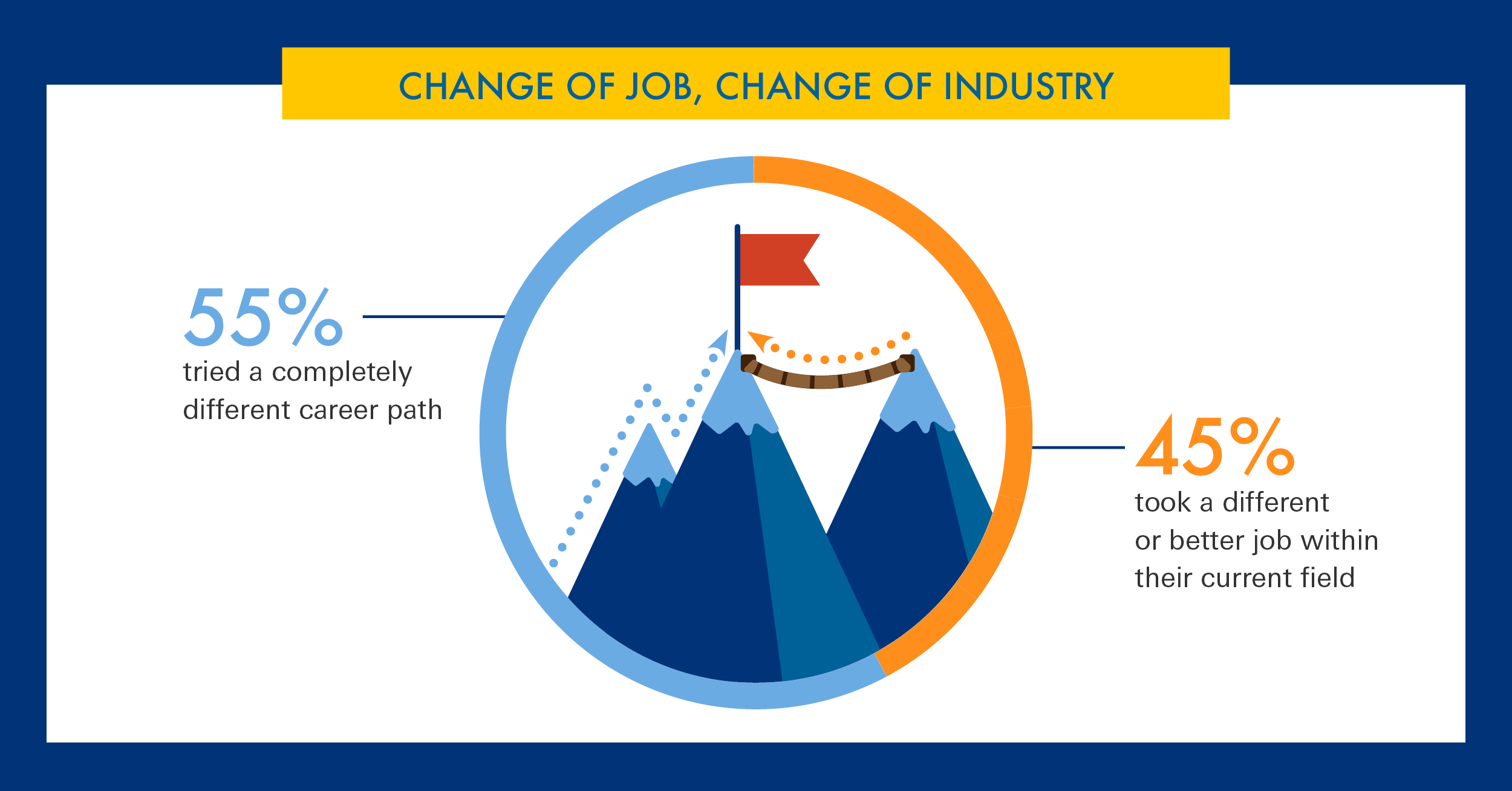
Reasons for Considering a Change & Leaving a Job
No one leaves an established career overnight. Not even the worst day at work can prompt a person to make a rash decision to abandon years of experience and prompt them to try something new.
Changing careers starts with a single seed: considering the possibility of changing job. There are many reasons why someone may entertain the notion of leaving a position. Among those polled, workload and long hours were the leading factor in making a change. The second most popular reason for considering leaving a job was location and longer commute times. Rounding out the top five reasons for considering a career change were monetarily related or corresponded to a lack of emotional payoff or reward to the job. These factors included low compensation, minimal chance for advancement, and a lack of passion for the work involved.
While the above factors planted the seeds of planning a career move, they weren’t always the driving forces behind those polled making a definitive leap. As with considerations for leaving a job, the leading reason for a person abandoning one career for another was workload and long hours, pointing to career changers desiring a better work-life balance. The second driver behind those polled changing careers was compensation, accounting for 17.19% of those polled desiring more money for a job. Minimal opportunity for advancement (15.94%), location (10.63%) and a lack of passion (9.38%) accounted for the top five reasons why people made the decision to hop to a new career.
Many respondents felt overworked and overwhelmed by the volume of work and the hours. When coupled with low compensation, long travel times, or little potential for advancement, motivated professionals will try to blaze past burnout and look to change jobs. This reflects a modern sentiment of working smarter, not longer for job satisfaction. As always, money is also a big motivator and many of those who changed careers had their bank accounts in mind when making the leap, along with better compensation packages from employers.
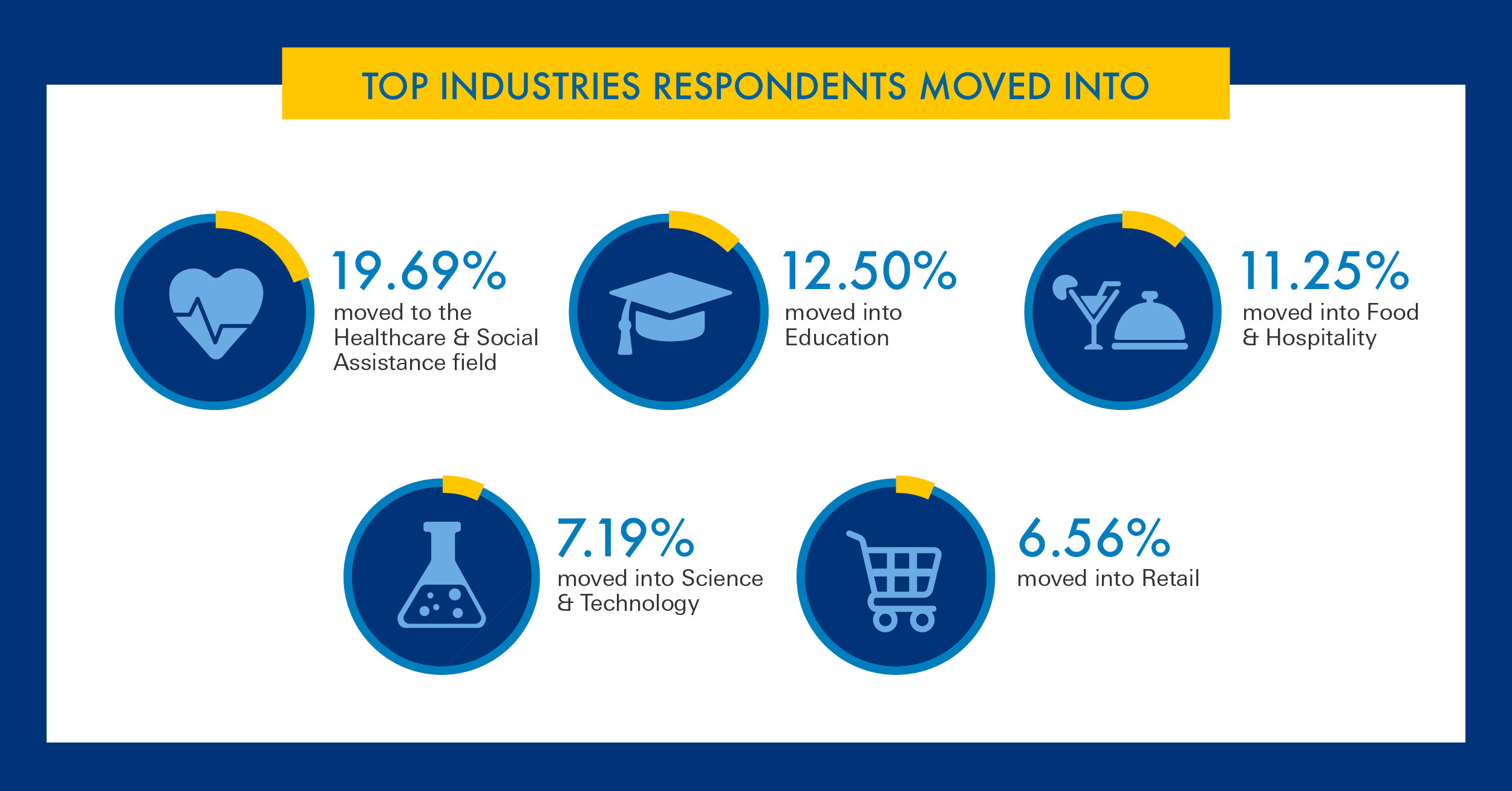
The Path to Change
Once individuals decided to change career paths, the first step many of them took was to pursue an educational track to help put them on a new course. Of those polled, 99.27% decided to go back to school to help further their new career goals.
The highest percentage of those polled (33.58%) obtained certification in their new chosen field to set off down their new career path. The remainder pursued more formal higher education degrees:
- 27.01% obtained a 2-year Associate’s degree
- 20.44% went back to school for a 4-year Bachelor’s degree
- 15.33% pursued a Master’s degree to give them an edge in their newly chosen career path
- 2.92% received their Doctorate
When considering a career change, undertaking an educational pursuit such as obtaining a Doctorate may seem daunting. However, for many who see an opportunity to grow and achieve distinction in their field, it’s a logical move.
Spurred by a desire to create a practical approach to health care, Mike Howley began his career as a physician’s assistant. Today, he holds a PhD and is a clinical professor of marketing in Drexel University’s LeBow College of Business: “I went back to school in my 40s and it just lit a fire under me. I found that the business people had the answers to so many of the issues that I struggled with to provide high quality care to our patients: how to manage service processes, business process redesign, quality interventions, and project management.”
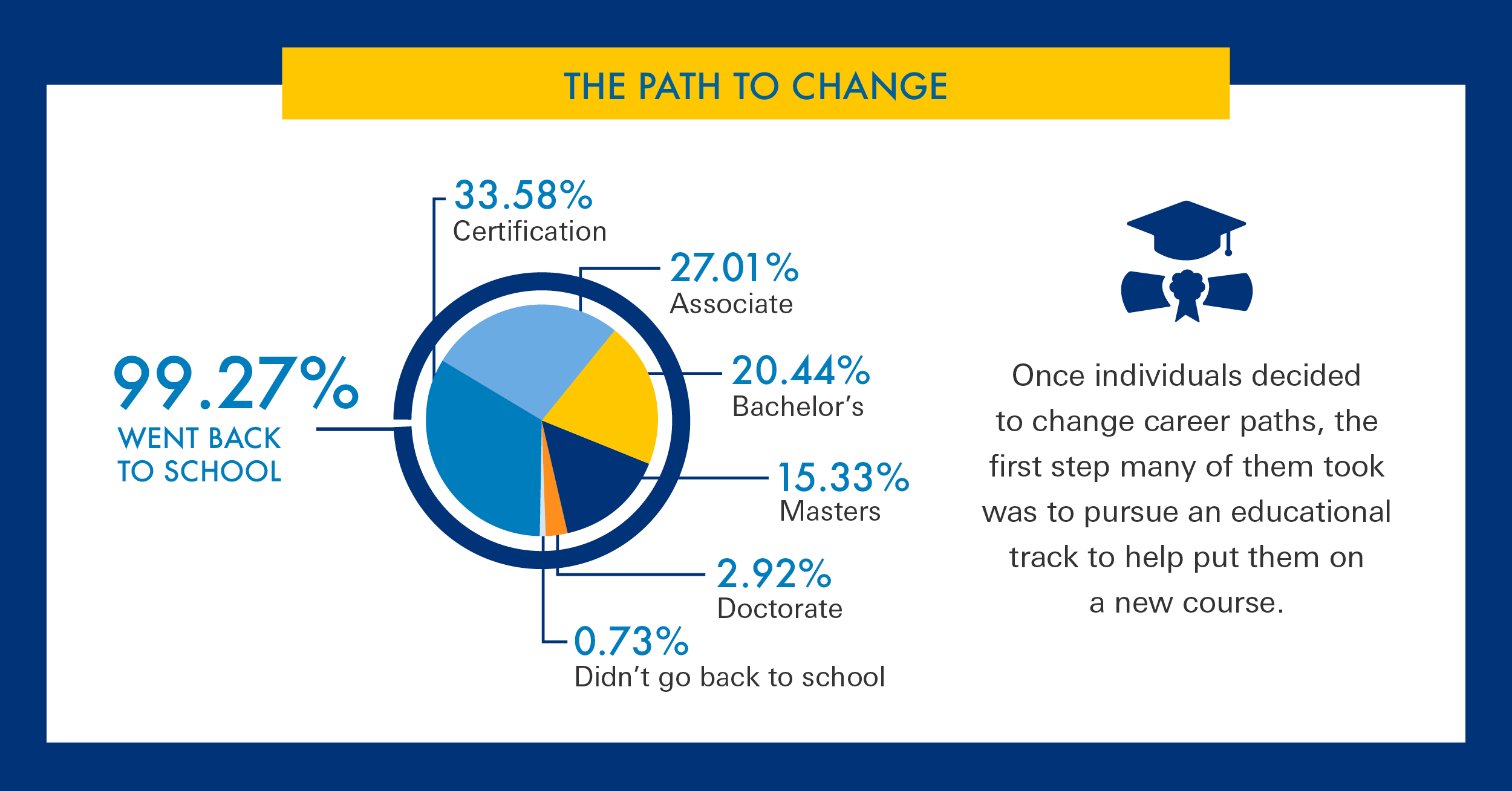
The Hardest Part of Changing Careers?
Making a big life change -- such as switching careers -- isn’t always easy. It requires some deep soul searching and methodical planning as to how to execute a successful career change. Only 13% of people we polled said that there “wasn’t anything difficult about it. Easiest decision I ever made,” when it came to switching career paths. However, a significant portion of respondents (31%) said that “general change and starting over” was the biggest difficulty in flipping their career.
Over 18% of respondents noted that going back to school and learning new skills was the most difficult part of the process for them for them, as well as the time it took to attend school and study while juggling a full-time job.
Additionally, 17% of those polled felt that the time it takes to change careers was one of the biggest challenges they faced. Working jobs while going to school, maintaining a work/life balance with their family, and making changes to their schedule to tackle a new career path all contributed to the issue of time in switching careers. People who had previously served in an employee role that took on their own entrepreneurial ventures had a tough time with not only going from an employee to a business owner, but to also “readjusting to being my own boss and setting my own schedule.”
Location was another barrier many career changers ran into. Over 10% of all respondents indicated that a change in location was difficult for them, due to either uprooting their families to move where a new job was located, adapting to a new environment, or longer commute times to work. In some instances, those polled took new jobs that were 1,500 miles away from where they lived at the start of their journey.
Beyond coordinating the logistics of a career change, several of those polled admitted to the emotional challenges they faced when considering a switch. Nearly 9% of respondents say that adjusting to new people or the loss of old coworkers was difficult for them, and less than 2% of respondents said that either their age or lack of experience when changing careers.
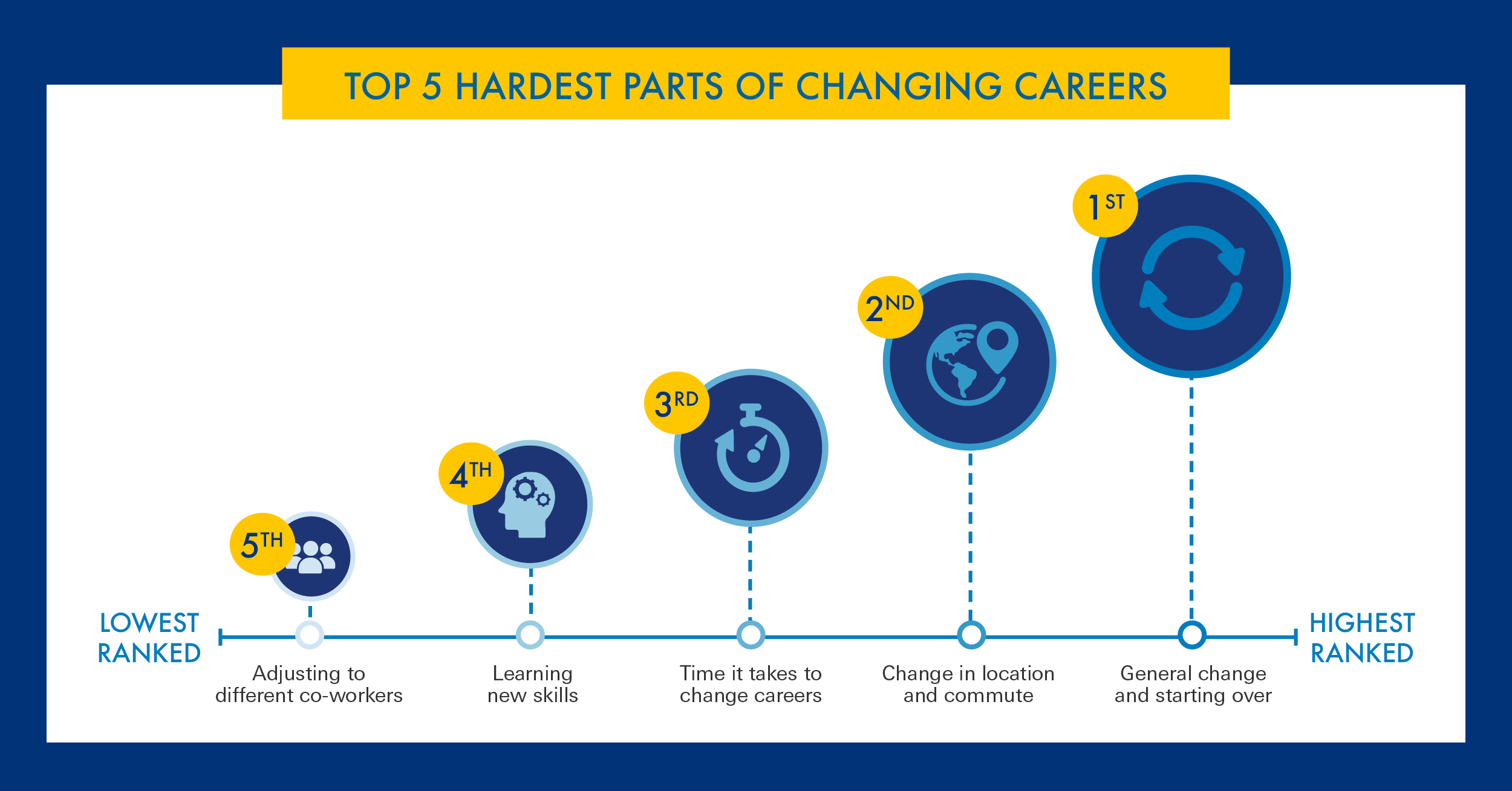
Was It Worth It?
When asked whether they were happy with their change of career, an overwhelming 95.9% of respondents said “YES!” Overall, people who chose to change careers were happier and felt they had a better quality of life, citing “more money and more home time” as one of the perks of their new career change.
Over 20% of respondents advised others to carefully consider and research their new career path. Similarly, 3.44% of respondents suggested that people looking to switch careers should carefully consider their current finances and future financial opportunities, while another 11% noted that education could offer career-switchers more of an advantage and should be their highest priority.
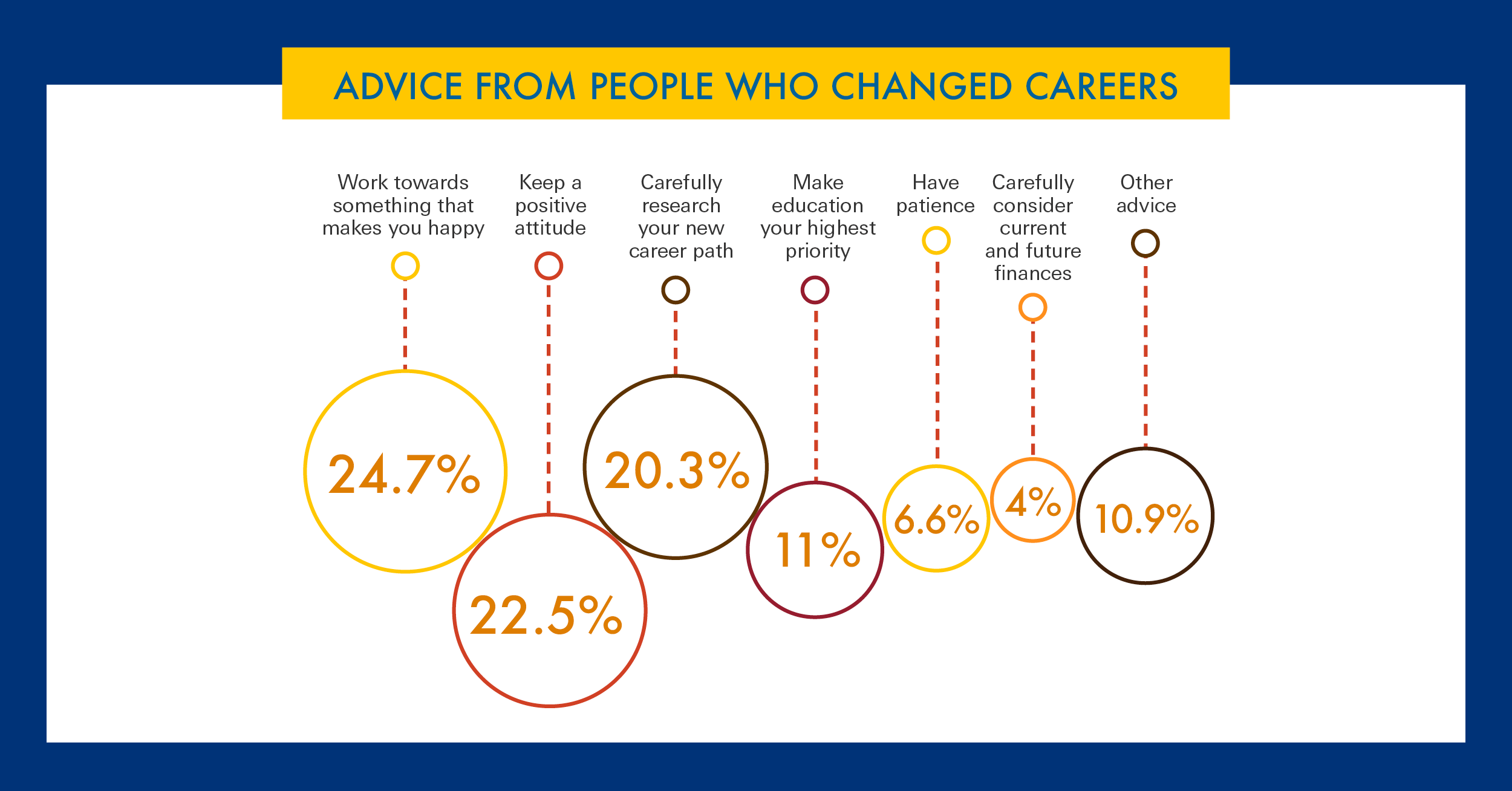
Many career-changers had practical advice for those considering making the leap themselves, encouraging others to seriously weigh their options and do their research before changing careers:
- “Research the field you’re going into to be better prepared.”
- “Look at hiring to see how long it takes,” as this may help career changers gauge how much they should have in savings to serve as a cushion until they’ve settled into their new career path.
- “Ask questions and keep trying to learn more!”
- “Make sure the life benefits are better, not just the money compensation,” citing job perks such as health insurance, vacation / sick time, maternity / paternity leave and other factors that contribute to overall job satisfaction and work / life balance.
Besides due diligence, many of those polled said that an optimistic outlook was key to changing jobs. Over 22% of respondents acknowledged that while changing careers can be a bit of a challenge, they recommended a positive, persistent attitude and encouraged others stick with their decision. Similarly, 6.56% suggested that people be patient during the process, encouraging others: “Don’t ever give up. Even when it’s tough. It will be worth it in the end. If it’s going to be better in the long run for your family, never give up.”
When asked to offer advice to those who may be considering making a similar jump, approximately 24.69% of respondents encouraged others to work towards a career that makes them happy: “Find something you love to do and it won’t feel like work.”
Thinking of making a career change? Drexel University offers 140 plus online degree programs and certifications across a wide spectrum of disciplines, arming students with the tools they need for success.
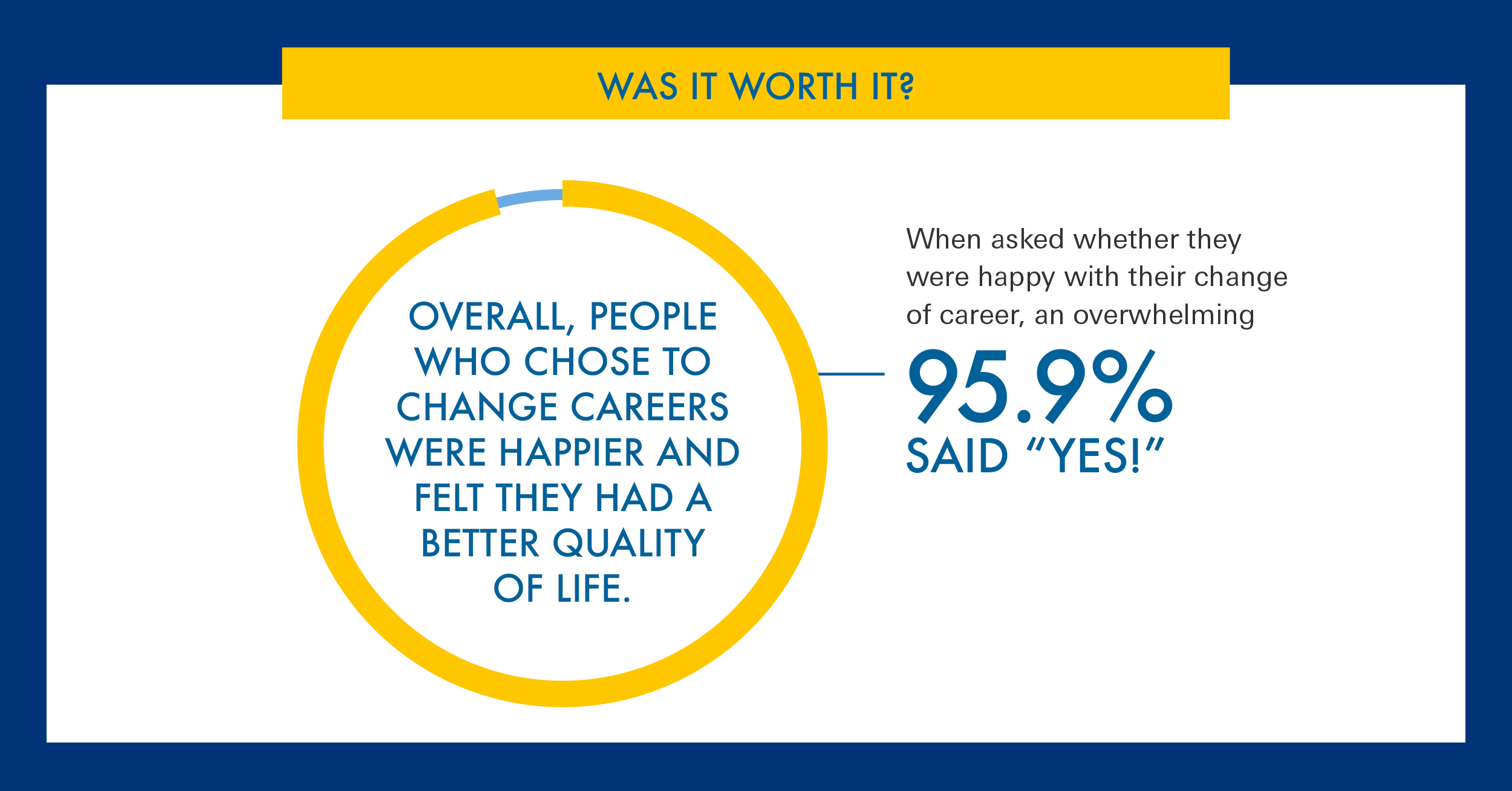
Click the infographic to download a PDF or share it via social media and email!

For more information on one of our nursing or other 140+ degree programs, please fill out this brief form. One of our Enrollment Counselors will contact you to answer any questions you may have.







